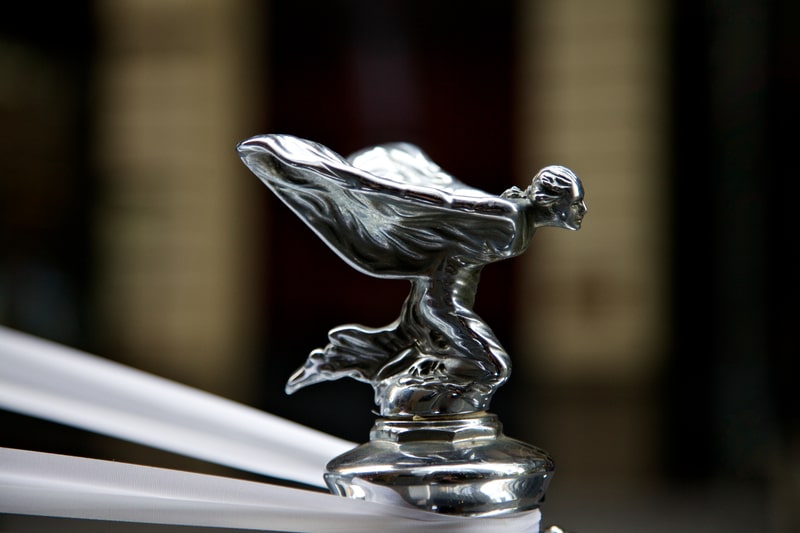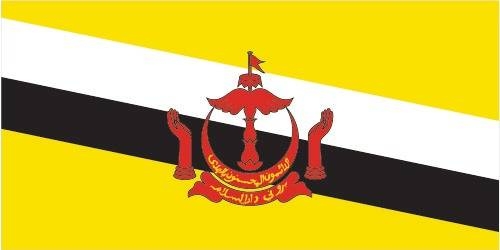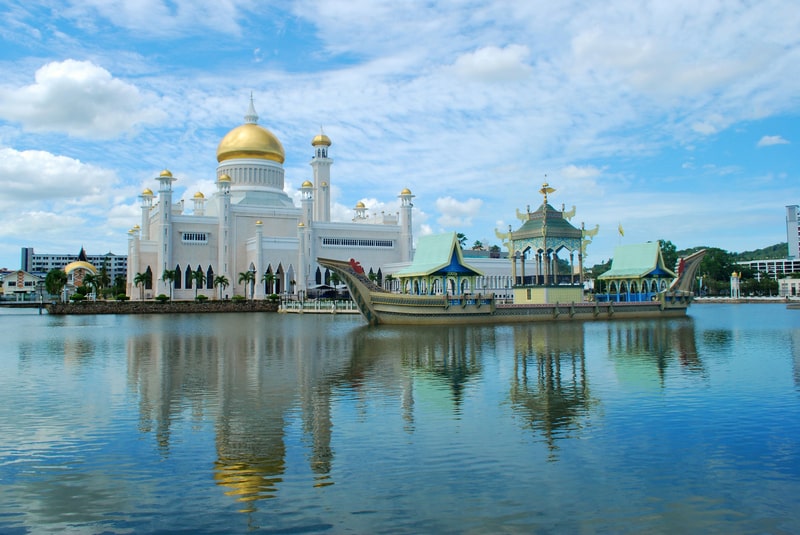Last updated on September 4th, 2022
Despite being a tiny county, Brunei has one of the world’s highest living standards and it is the second-richest country in Southeast Asia, after Singapore. Brunei is home to breathtaking wildlife, bountiful oil reserves, and one of the only remaining absolute monarchies. Brunei surprises and delights in equal measures. Interested in knowing more about Brunei?
50 Interesting facts about Brunei
Royal Family
1. The World’s Longest- Reigning Male Monarch
Hassanal Bolkiah, the Sultan of Brunei, is currently the world’s longest-reigning male monarch having ruled for 54 years as of 2022. Queen Elizabeth II is currently the longest-reigning monarch; she has reigned for over 70 years.
2. Brunei Is One Of The Only Remaining Absolute Monarchies
Brunei and Bhutan are the only absolute monarchies left in Asia. As an absolute monarch, the Sultan of Brunei is head of government and state. He is also King, Prime Minister, Minister of Foreign Affairs, Minister of Finance, and Minister of Defense.
3. World’s Largest Residential Palace
According to the Guinness Book of World’s Record, the Istana Nurul Iman Palace in Brunei is the world’s largest residential palace; it is the official residence of the Sultan of Brunei. It boasts 1,788 rooms, covers 50 acres of land, and was constructed for $1.4 billion.

4. Sultan of Brunei Enjoys Unparalleled Luxury
According to the Insider, he owns 500 Rolls-Royce cars, has a 1,788-room palace, and regularly enjoys $20,000 haircuts.
5. The Sultan’s Birthday Is An Important Date in the National Calendar
July 15th, the Sultan’s birthday, is marked by nationwide festivities and activities. The day begins with mass prayer throughout Brunei. The Sultan addresses the public later in the day.
History & Politics
6. The Early History of Brunei & Its Royal Family Is Clouded in Mystery
This is because of a scarcity of records and also attempts to create an Islamic version of history that blots out everything else.
7. Brunei Was Once a British Protectorate
Brunei was a British protectorate from 1888 to 1963 when full independence was attained from the British.
8. Brunei Choose to Remain a British Protectorate Rather than Joining the Federation of Malaysia
Brunei was the only Malay state that chose to remain a British protectorate in 1963 instead of joining the Malaysian federation.
9. The Japanese Occupied Brunei from 1941 to 1945 During the Second World War
The Japanese occupation was characterized by the plunder of resources. By the end of the occupation, the country was in near ruin. There was heavy fighting for control of Brunei town which resulted in much of it being destroyed.
10. Brunei Doesn’t Have Elected Representatives
All members of the legislative council are appointed by the king. Although there are no elections, there is one legal party: The National Development Party (NDP.)

Religion
11. Brunei Was the First East Asian Nation to Adopt Sharia Law
Sharia Law was adopted in 2014 despite widespread international condemnation. This imposes maiming, stoning, caning, and other punishments for theft, gay-sex, and adultery.
12. Brunei Is The Most Islamic Observant Nation in Southeast Asia
Beautiful mosques are found around the country and most Bruneians consider themselves observant Muslims.
13. Brunei Follows A Less-Orthodox Sect of Sunni Islam
This sect is less rigid and even allows following some pre-Islamic traditions. In Brunei, the bride and her groom can wear gold jewelry, which is considered an un-Islamic item by many Islamic scholars.

14. Brunei Has Some of the World’s Most Beautiful Mosques
Brunei’s mosques are known for their elegance and beauty. The architecture of these mosques perfectly blends futuristic and traditional elements.
15. About 7% of The Population is Christian
Christianity is the second-largest religion practiced in Brunei.
16. Christmas Day Is Banned By Decree In Brunei
It is illegal to celebrate Christmas in public. However, many Christians and even Muslims celebrate it in the privacy of their homes.
17. Marriages Between Muslims and Christians are Prohibited
A Muslim marrying a Christian is a crime that can be punished by death. The law discourages Muslims from learning about other religions.
Media in Brunei
18. Brunei’s Media is Neither Free nor Diverse
Broadcasting is dominated by state TV and radio. The private press is controlled or owned by the royal family. Journalists have to exercise self-censorship when covering religion or politics.
19. About 99% of The Population in Brunei Are Active Social Media Users
According to Statista.Com, 99% of Bruneians are active on social media. Despite government attempts to control mainstream media, most citizens still use social media to find independent and unbiased information.
Brunei on map
Economy
20. Brunei Has the Second Highest Human Development Index (HDI) in Southeast Asia, After Singapore
Brunei is classified as a developed nation. The International Monetary Fund (IMF) ranks Brunei fifth in the world in terms of GDP per capita at purchasing power parity.
According to the UN, Brunei is ‘very high in human development.’ Brunei’s HDI has been progressively improving since the 1990s.
21. Brunei Is The Second Lowest Corrupt Country in the Region, Behind Only Singapore
The 2019 Transparency International (TI) index ranks Brunei as the 35th least corrupt country in the world with a good score of 60 out of 100.
22. Brunei Has One of The Highest Vehicle Ownership Rates Globally
In Brunei, there is roughly one car for every 1.5 people. This indicates that most Bruneians are in a good financial position.
23. In 2018, Public Debt in Brunei was 2.4% of the Economy
As of 2018, the public debt of the U.S. was 80% of GDP. Brunei is one of the least indebted countries in the world.
24. Brunei Doesn’t Levy Income Tax on Individuals
There is also no value-added tax (VAT) or sales tax. Bruneians don’t pay social security taxes. However, citizens must contribute 5% of their income to a provident fund managed by the state.
25. Brunei Has The Least Number of Taxes in The Region
Corporate tax has been gradually reduced to the current rate of 22%. That makes Brunei one of the best places for doing business in Southeast Asia.
26. Brunei Doesn’t Have a Minimum Wage
Because there is no minimum wage, pay rates must be agreed upon with the employer or through collective bargaining.
27. Brunei’s Unemployment Rate in 2021 Was Around 8.3%
Youth unemployment is a big issue in Brunei. The government is trying to diversify the economy to reduce unemployment.
28. Brunei Is the 3rd Largest Oil Producer in Southeast Asia
They produce around 180,000 barrels per day. They are also the 9th largest producer of LNG gas in the world.
29. Oil and Gas Account for Most Exports
A few products apart from petroleum are produced locally. Therefore, Brunei must import most items. Singapore is the source of 25% of the imports.
30. Brunei Might Be Running Out of Oil
According to BP World, the hydrocarbon resources of Brunei might be depleted in the next two decades. Thus, there is the need to diversify the Bruneian economy.

31. The Bruneian Dollar Is Pegged to Singapore’s Currency
If the country’s foreign reserves melt considerably, this might become a problem.
32. Most of the Country’s Beef Comes from Australia
Brunei owns a cattle farm in Australia that supplies the country with beef. The ranch is bigger than Brunei itself.
33. Brunei Has One of The Biggest LNG Plants in the World
Wikipedia indicates that the Brunei Liquefied Natural Gas (LNG) plant is one of the largest in the world. It sits on a 130-acre complex and pumps over 6.8 tons of liquefied gas every year.
34. Less Than 1% of Electricity is Produced from Renewable Energy
As of 2020, fossil fuels account for over 99% of electricity produced in Brunei.
Education & Health
35. 97.2% of The Population Is Literate
In Brunei, education is free and compulsory. Education begins at five years when children attend preschool for one year. Primary school education lasts for six years.

36. Brunei Citizens Receive Free Healthcare
In Brunei, immunization coverage is about 97.8%; this exceeds the WHO target which is 95%. The healthcare system comprises 22 maternal facilities, 10 clinics, and 15 health centers. Brunei was one of the first nations to get ahead of the Covid-19 pandemic.
37. Brunei Ranks High in Gender Parity in Health & Education
In Brunei, women are given equal opportunities in training and education. Bruneian women have excellent health. Women receive free pre and postnatal health services.
38. Women’s Participation In The Bruneian Economy Is High
49% of Brunei’s civil service is made up of women. Since 1971, there has been a dramatic increase in the participation rate of women in the Bruneian economy.
39. The Average Life Expectancy in Brunei is 75 Years
Free healthcare contributes to the high life expectancy. There is also a low crime rate in Brunei.
40. The Leading Causes Of Death In Brunei Are Non-Communicable Diseases
Diabetes, stroke, and heart disease are the top causes of death in Brunei. That is because of sedentary lifestyle caused by modernization.
41. Brunei Has the Highest Obesity Rate in ASEAN and One of The Highest Rates in Asia
Studies by Brunei’s Ministry of Health indicated that around 30 percent of school-going children are obese.
. . . continue reading on the next page
